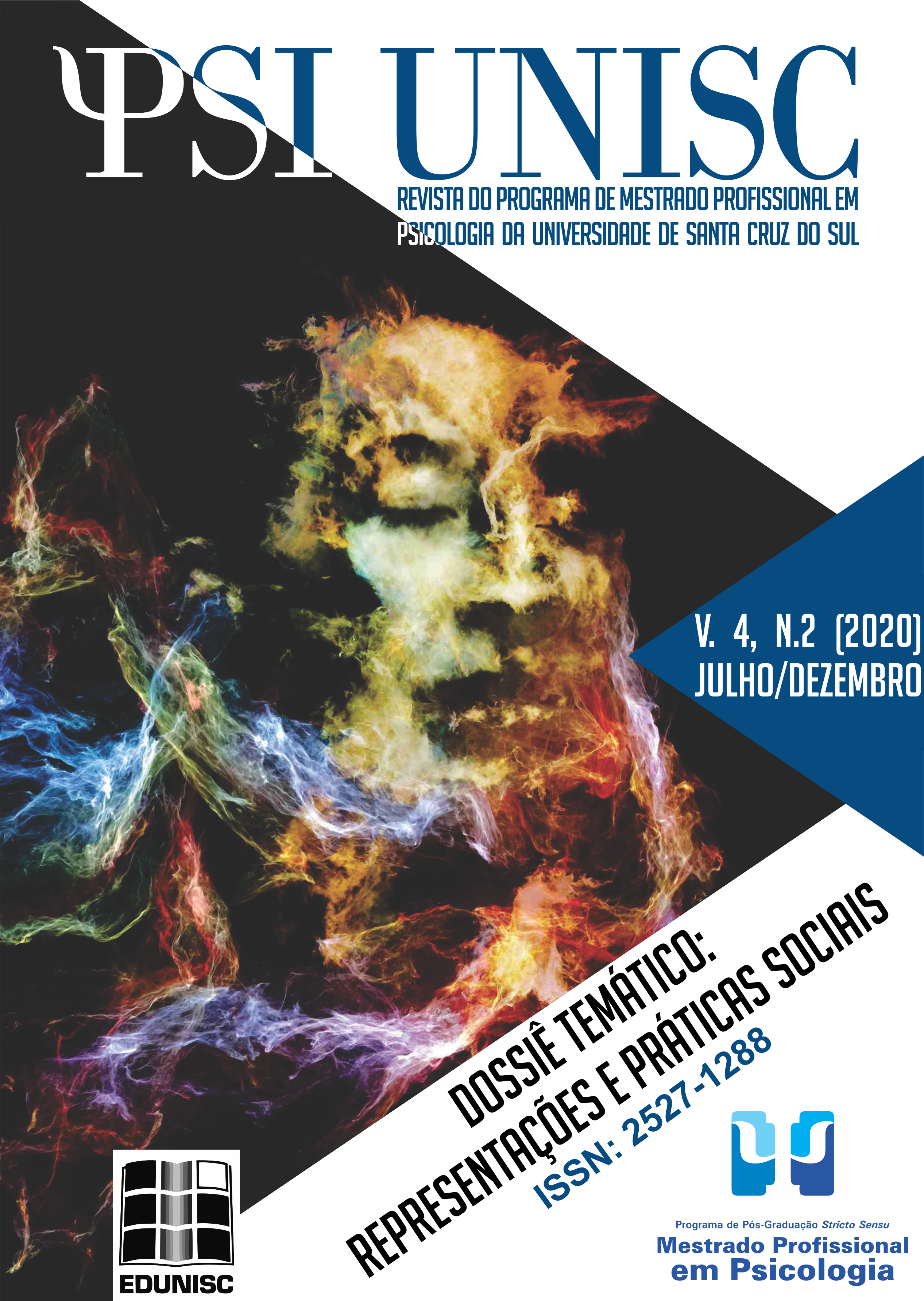Comunidades Terapêuticas: um Relato de Experiência sob o Olhar da Psicologia Comunitária
DOI:
https://doi.org/10.17058/psiunisc.v4i2.14811Palavras-chave:
Comunidades terapêuticas, Saúde mental, Reabilitação.Resumo
Este trabalho é fruto de um relato de experiência que ocorreu durante a disciplina de Psicologia Comunitária, do curso de Psicologia de uma Instituição de Ensino Superior (IES). O relato é referente a uma visita técnica em uma Comunidade Terapêutica (CT) situada no interior de uma cidade de médio porte do Estado do Ceará. O principal objetivo deste trabalho é apresentar as percepções encontradas durante a visita em questão, estabelecendo uma conexão com o referencial teórico utilizado durante a disciplina de Psicologia Comunitária, propondo discussões acerca dessas entidades. Na comunidade em questão, nota-se uma percepção sobre esse ambiente como um lugar “perfeito”, em que só depende do indivíduo a total recuperação da sua dependência química e esta deve ser baseada em um tripé que constitui a comunidade: convivência, trabalho e espiritualidade. Compreendemos a CT do presente estudo como uma amostra de CT’s. Os resultados dessa análise foram essenciais para o processo de monitoria na disciplina de Psicologia Comunitária de uma das autoras desse artigo, pois a volta do campo permitiu uma reflexão crítica sobre o fenômeno das CT’s, possibilitando a identificação de demandas e de possíveis situações que geram sofrimento psíquico nos sujeitos inseridos nesse espaço. Podemos considerar esse fenômeno como um retrocesso na luta antimanicomial, uma vez que esta tem como objetivo um tratamento que foge de todo modelo de exclusão, no qual o sujeito em sofrimento psíquico não deve ser segregado.
Downloads
Referências
Alverga, A. R., & Dimenstein, M. (2006). A reforma psiquiátrica e os desafios desinstitucionalização da loucura. Interface - Comunic., Saúde, Educ., 10(20), 299-316. doi: 10.1590/S1414-32832006000200003
Bauman, Z. (2003). Comunidade: a busca por segurança no mundo atual. (P. Dentzien. Trads). Rio de Janeiro, RJ: Zarah.
Brasil. Ministério da Saúde. Secretaria Executiva. Coordenação Nacional de DST e AIDS. (2003). A política do Ministério da Saúde para atenção integral a usuários de álcool e outras drogas. Brasília, DF.
Campos, R. D. F. (2011). Introdução: a psicologia social comunitária. In R. Campos (Eds.), Psicologia social comunitária: da solidariedade à autonomia. (20a. ed., pp. 9-15). Petrópolis, RJ: Vozes.
Conselho Federal de Psicologia [CFP]. (2018). Relatório da Inspeção Nacional em Comunidades Terapêuticas. Recuperado de https://site.cfp.org.br/wp-content/uploads/2018/06/Relat%C3%B3rio-da-Inspe%C3%A7%C3%A3o-Nacional-em-Comunidades-Terap%C3%AAuticas.pdf
Conselho Federal de Psicologia. (2005). Código de ética profissional dos psicólogos. Brasília: CFP. Recuperado de http://site.cfp.org.br/wp-content/uploads/2012/07/codigo-de-etica-psicologia.pdf
Fossi, L. B., & Guareschi, N. M. F. (2019). Aspectos Punitivos do Tratamento nas Comunidades Terapêuticas: O Uso de Drogas como Dano Social. Revista Psicologia e Saúde, 11(1), 73-88. doi: 10.20435/pssa.v0i0.611
Freud, S. (2010). O mal-estar na civilização, novas conferências introdutórias e outros textos (P. C. Souza. Trads.). São Paulo, SP: Cia. Das Letras.
Góis, C. W. D. L. (2005). Psicologia Comunitária: atividade e consciência. Fortaleza, CE: Instituto Paulo Freire de Estudos Psicossociais.
Lei nº 10.216, de 6 de abril e 2001. Dispõe sobre a proteção e os direitos das pessoas portadoras de transtornos mentais e redireciona o modelo assistencial em saúde mental. Recuperado de http://www.planalto.gov.br/ccivil_03/leis/leis_2001/l10216.htm
Machado, L. V., & Boarini, M. L. (2013). Políticas sobre drogas no Brasil: a estratégia de redução de danos. Psicologia: Ciência e Profissão, 33(3), 580-595. doi: 10.1590/S1414-98932013000300006
Machado, M. N. da M. (2004). Práticas psicossociais: pesquisando e intervindo. Belo Horizonte, MG: Edições do Campo Social.
Pitta, A. M. F., & Guljor, A. P. (2019). A violência da contrarreforma psiquiátrica no Brasil: um ataque à democracia em tempos de luta pelos direitos humanos e justiça social. Cadernos do CEAS: Revista crítica de humanidades, (246), 6-14. doi: 10.25247/2447-861X.2019.n246.p6-14
Portaria nº 131, de 26 de janeiro de 2012. Institui incentivo financeiro de custeio destinado aos Estados, Municípios e ao Distrito Federal para apoio ao custeio de Serviços de Atenção em Regime Residencial, incluídas as Comunidades Terapêuticas, voltados para pessoas com necessidades decorrentes do uso de álcool, crack e outras drogas, no âmbito da Rede de Atenção Psicossocial. Recuperado de http://bvsms.saude.gov.br/bvs/saudelegis/gm/2012/prt0131_26_01_2012.html.
Santos, M.P.G. (2016). Comunidades Terapêuticas: unidades de privação de liberdade? Boletim de Análise Político-Institucional. (10), 39-46. Recuperado de: http://www.ipea.gov.br/portal/index.php?option=com_content&view=article&id=29664&Itemid=6
Sawaia, B. B. (2011). Comunidade: A apropriação científica de um conceito tão antigo quanto a humanidade. In R. Campos (Eds.) Psicologia social comunitária: Da solidariedade à autonomia. (20a. ed., pp. 29-43). Petrópolis, RJ: Vozes.
Souza, L. F., Souza, A. C., Souza, E. O., Abrahão, A. L., & Fernandes, F. L. (2016). A universidade como parceira na formação diferenciada para o cuidado aos usuários de drogas. Pesquisas e Práticas Psicossociais, 11(3), 570-582. Recuperado de http://pepsic.bvsalud.org/scielo.php?script=sci_arttext&pid=S180989082016000300004&lng=pt&tlng=pt
Downloads
Publicado
Como Citar
Edição
Seção
Licença
A submissão de originais para este periódico implica na transferência, pelos autores, dos direitos de publicação impressa e digital. Os direitos autorais para os artigos publicados são do autor, com direitos do periódico sobre a primeira publicação. Os autores somente poderão utilizar os mesmos resultados em outras publicações indicando claramente este periódico como o meio da publicação original. Em virtude de sermos um periódico de acesso aberto, permite-se o uso gratuito dos artigos em aplicações educacionais e científicas desde que citada a fonte conforme a licença CC-BY da Creative Commons.




